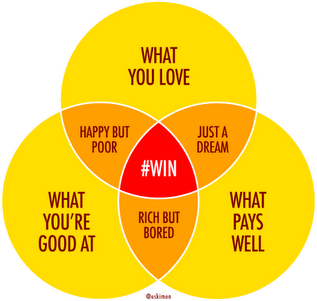
How to Get a Better Job - The ultimate guide to get your dream job

There are a millions of job search articles on the web, and as a job seeker it's easy to spend hours every day reading them. It's a great way to procrastinate, but not a great way on how to get a better job... or better yet, to land your dream job. To save you some time here are the top 5 recent articles about the job search:
- What Recruiters Look At During The 6 Seconds They Spend On Your Resume
- Quiz: What Career Should you actually have?
- Pepsi CEO's Mother Had A Brutally Honest Reaction To Her Daughter’s New Job
- A Fan Asks Mike Rowe For Career Advice...He Didn't Expect This Response, But It's Brilliant.
- Employees Who Stay In Companies Longer Than Two Years Get Paid 50% Less
- Job Descriptions for 2020's Most In Demand Jobs
- Affordable Resume Writing Services
These articles are generally useful, but not nearly enough. The simple things you’ll need to get a job are well covered:
- A great resume
- A consistent online presence
- No red flags
- Skills that match the job description
But even if you’ve got those covered, there are hundreds of variables you leave up to chance when applying for a job. You risk being lost in a pile of resumes. The job requirements changing. The budget changing. An internal referral stealing your spot. The hiring manager going on vacation.
So how do you guarantee you’ll get the job you want? We have the system.
Take the uncertainty out of your job search process by following these 7 steps, and you’re virtually guaranteed to get what you’re after. The extra patience, hustle, and attention to detail is worth the investment in your career trajectory.
Recommended links:
- Our collection of 500+ professional resume examples.
- Our gallery of 20+ downloadable resume templates.
Step 1: Self-reflection
"If you know the enemy and know yourself you need not fear the results of a hundred battles." - Sun Tzu
You must first know two things before you attack your job search:
- Exactly what you want in a job
- An accurate idea of your skills and experience
The system you’ll be using will allow you to punch above your weight class, but doesn’t mean that 3 years in online marketing can land you a front-end web development job. You need to be honest about what you want, where you’re at now, and where you want to be in the future.
Step 1A: Decide exactly what you want
"If a man knows not to which port he sails, no wind is favorable." - Seneca
Before you look for a job, you need to figure out what is most important to you. If you're just starting your career, focus on developing valuable skills. Don’t necessarily “follow your passion,” but seek work that is interesting and will help you develop your skills. Look for a company that fits any (ideally all) of the following criteria:
- Has a mission you believe in
- Is growing fast
- Has a great team to learn from
In Drive, Dan Pink finds that the three things employees want most from work are:
- Autonomy – the desire to direct their own lives.
- Mastery — the urge to get better and better at something that matters.
- Purpose — the yearning to do what they do in the service of something larger than themselves.
Your first goal should be mastery , which means finding a place to develop your skills.
Another study performed by John Graham, a professor of social work, found that the top five traits that make employees happy are:
- A strong sense of engagement in their work.
- A feeling of being appreciated and valued
- Having a high degree of freedom
- pleasant physical workspace and good relationships with clients and colleagues
- Flexible work schedules
If any of these ring true, add them to your list of standards for a job. Cal Newport’s must-read career book So Good They Can’t Ignore You has similar advice.
- Master a skill that is rare and valuable.
- Cash in the career capital this generates for the right rewards.
- Set your standards for skills development higher than other factors. The rewards will come later.
Grab a notebook or open a new document, and write down everything you could possibly want in a job.
Step 1B: Assess your skills and experience
The next step is to do an honest assessment of your skills and experience.
In that same notebook, write down the following:
All the expert knowledge you have.
Your best accomplishments.
All your skills.
Your greatest strengths.
This knowledge will help you figure out in which positions you’ll be able to do your best work. Your best job lies at an intersection between exactly what you want and your skills. Again, put less emphasis on “what you love,” but if you can fit that criteria as well it is a bonus.

If you’re not good at anything that has the potential to pay well, you’ll need to level up your skills and experience. Be honest and decide whether now is the time to improve your skills before looking for a job. Here are 5 ways to do so:
- Take an online course
- Go back to school
- Work on a new project in your spare time
- Get a job where you’ll learn the skills.
- Work part time for free where you can learn the skills
Step 2: Prepare for success
"Success is where preparation meets opportunity." - Bobby Unser
Once you begin to know yourself, it’s time to start building your positioning and personal brand. Positioning is a marketing term coined by Al Ries and Jack trout which relates to how marketers attempt to *create a distinct impression in a customer's mind. *
It is why Volvo is safety. Why Apple is design. Why Fedex is overnight.
Personal positioning involves controlling how you will be perceived by other people. For anything you want to accomplish in life that involves other people making decisions about you - positioning matters. This is especially true when looking for a job. Whether you like it or not, employers (and everyone around you) are judging you based on their initial perceptions. And it is very hard for people to change their initial perceptions.
"When you meet someone for the first time, or walk into a house you are thinking of buying, or read the first few sentences of a book, your mind takes about two seconds to jump to a series of conclusions." - Malcolm Gladwell
You are being judged upon your first point of contact with an employer, which could be the difference between a new career or your resume being shredded. Any minor detail can tip the scales - and it is your job to tip the scales in your favour.
You’re not going to change much between when you see a job description and apply for a job, however you can change your positioning by focusing on the right things, getting into the mind of the prospect (employer), and tailoring your application accordingly.
Remember, you never get a second chance to make a first impression. Until you are ready to position yourself, you are better off if communication doesn’t take place.
For any job, use the following system to position yourself for success. Your goal is to figure out who the ideal person the company (or industry) is looking for to fill the role. This refers to that person's skills, personality, style, and expertise.
Follow these three steps to figure out exactly what a company is looking for.
Research the company. Look at their website, news, press releases, and company page. What you're trying to find out is how they are trying to be percieved by the market. Your job is to fit into their ideal perception. Even if they're an old-school corporation, if you can tell they're trying to be new and fresh, you want to come across as new and fresh (but not too new and fresh).
Look for clues in the job description. Most job descriptions aren't very detailed, but look for hints that give an idea of the type of person the company is looking to hire.
Get into the heads of the hiring managers and VP's. Follow the people involved in the hiring decisions on Twitter, LinkedIn, and any online resources. This will give you a good idea of the personality type they're looking for.
Note this works on a broader industry level as well - position yourself to fit well in the industry and role you're looking for. This makes things easier than doing it company by company. Once you’ve a better idea of how you want to be percieved by the hiring company, do the following.
Build a master resume to work from. Your resume will be ever-evolving, but you need to start with an excellent one. Our Resume Guide gives a good overview of how to build a stand-out resume.
Write a generic cover letter. This is a letter that will outline your skills, experience, and why you’re so amazing. It will be tweaked for each job application.
Beef up your LinkedIn Presence. Update your LinkedIn with relevant work experience, your summary, and your brand. Add at least 50 people to your network.
If relevant, beef up your Twitter brand. Write a good description of yourself, follow influencers in the industry, and share relevant content using a tool like Buffer or Hootsuite.
If relevant, start a personal blog. Pick a subject you like and write valuable content for a specific audience. This takes commitment, so make sure you’ve got enough material for at least 5 decent articles to display.
Create an online portfolio of your projects. Create a site where it’s easy to share work samples and projects with employers.
Step 3: Look for job opportunities
Once you know exactly what you want and what you bring to the table, it’s time to look for a job. Ensure that every job you decide to go for meets your criteria you set out in stage 1 - if the job doesn't excite you, you won't be willing to go the extra mile. Follow these steps for finding a job opportunity you'll love:
List all the companies whose products you use and love. If you already love a companies’ product, you’ll do much better in getting hired. You won’t have to fake the passion, and will be excited to do the work to get the job. Look at their careers page for open opportunities.
List all the companies you think you’d like to work for. This could be companies you admire, companies that are building cool products, or companies with a great reputation. Look at their careers page for open opportunities.
List people in your network who work for great companies. Make a list of people you know who have awesome jobs that you’d like to have one day. Research the companies they work for and check their careers page for open opportunities.
Search for jobs on Indeed.com and niche job boards. Indeed.com is the most comprehensive job search engine on the planet. It also drives a lot of volume, which means high competition. Niche job boards in your industry are less competitive and feature more specialized positions. View our comprehensive list of job boards and employment resources here: Ultimate Job Search Resource Roundup
Compile a list of at least 5 jobs that you really want. This is crucial - you have to actually want the job. If you don’t want the job you will not be willing to put in the extra work required.
Use Tab 1 of the Job Seeker Spreadsheet to manage the process.
If you find yourself with excess jobs, apply to them the traditional way with a kick-ass resume and cover letter. It’s good practice, and it could work out.
Step 4: Create an application system
Now that you’ve got your list of 5 jobs you really want, it’s time to get serious about landing them. Instead of the traditional method of blindly submitting a resume and hoping for the best, follow these 6 steps for every job.
Study the job description and decipher what problems the employer wants solved. Employers don’t care about you. They care about solving their problems. This is the only reason why they are posting a job. Get into their heads, and try to understand their pain.
- Why are they posting this job?
- Who is the ideal candidate for the job?
- Which skills does the ideal applicant have?
Write down a brief description of the ideal applicant in the third person, all the way down to what they’re wearing. This will help with your positioning when applying for the job.
Write down a brief description of the ideal applicant in the third person, all the way down to what they’re wearing. This will help with your positioning when applying for the job.
Example "3rd person" description:
Kyle is a professional marketer who graduated with a marketing degree from UCLA in 2011. He’s worked for three years in the digital agency world in LA, learning content marketing, SEO, and SEM. He pays attention to the details and is reliable. Skills include Photoshop, indesign, and basic HTML. Kyle dresses in a classic navy business suit - but with bright socks and a colorful tie.
Write a cover letter detailing how you’re going to solve the employers problems. Apply your skills and work history to what the employer is looking for. Besides a traditional cover letter, write (but don’t send) a 3 paragraph email outlining why you’re the ideal person for the job and why you’re excited about it.
Tailor your resume to fit the job description. Change specific words, wording of accomplishments, and even job titles to better fit the position.
DO NOTHING. Keep these documents handy for the next steps of the process.
Extensively Research the Company. Your biggest advantage is information, and almost everything you need to know about a company can be found online. Here are the questions to answer about the company you're applying for:
- What does the company do?
- Why do they exist?
- What recent milestones has the company surpassed?
- What is their culture like?
- What kind of people do they typically hire?
- Do I know anyone who works there?
- Do I have any loose connections there?
Use the following resources to get your answers:
- The company website
- Google news
- Youtube
- Google Finance
- Glassdoor.com
- Twitter.com
- Facebook.com
- Instagram.com
Be armed with as much data as possible. This post from Reddit Jobs has an excellent system for preparing for interviews which increased the person's interview success rate by over 700%.
*At this point, I had spent the past TWO DAYS studying the organization and practicing my answers. In these two days, I still treated finding a job like my job, but I didn't apply to any new jobs. *
I simply prepared for this first interview. By the time I got there, there wasn't a question they could throw at me that I didn't have the perfect answer to. I came here to r/jobs, I searched for first interviews, I searched for first interview questions to ask, etc. I studied my answers and how I would say them--at what speed, how I would use my hands, etc. I also practiced my posture so that I could have a confident posture as I interviewed.
Step 5: Get noticed by decision makers
This is the most important step in landing the job. You need to impress the people making the hiring decisions. Follow these steps.
Step 5A: Research the decision makers and get connected
Find out the following about the company:
- Who is the CEO?
- Who is the VP in charge of the department?
- Who is the hiring manager for this position?
- Who is the recruiter?
- Who is working at a similar job?
Your job is to get into the heads and hearts of these people. Follow them on Twitter, study their LinkedIn profiles, read news articles, quotes, and blog posts.
Use Tab 2 of the Job Seeker Spreadsheet for each target introduction.
DO NOTHING WITH THIS INFORMATION. Do not email them. Do not ask them a question on Twitter. Do not randomly start retweeting them. You only get one chance to make a first impression, and need to do it strategically.
Step 5B: Find out how you’re connected to the target decision maker.
Conduct a LinkedIn search to see how you’re connected to each person. Decide if your connection to them is good enough to ask for an introduction. If you have more than one connection, pick the most powerful first but don’t hesitate to attack from different angles.
Step 5C: Make initial contact
The next step is to leverage your connections to make contact with the decision maker. Send your best connection the following emails:
- An introduction email with a quick brief on why you’re a great fit for the job, which includes asking if you can send them your resume to forward
- Upon reply, send a brief paragraph explaining why you’re a great fit for the job with your resume attached.
Here is an example where Tim is trying to get a job introduction to Kristine from Samantha.
Hi Samantha,
Hope you’re well. Can’t believe the Market Research Summit was 6 months ago! Hope to see you there this year. I’m emailing about the market research analyst job that was posted last week. I’m looking to move back into full-time work from the consulting world and It looks like a great fit. Do you think you could make an intro to Kristine for me? Let me know and I’ll send over my details in a separate email.
Cheers,
Tim
Hi Tim,
Great to hear from you, it definitely looks like it could be a fit! Please send over your details and I’ll forward it to Kristine.
Samantha
Hi Samantha,
Thanks for offering to make the referral to Kristine. I’m moving out of the consulting world and looking for a full-time gig. In the last 3 years I’ve specialized in market research in the SMB Medical Device Space.
My best accomplishment was a market research report focused on market penetration of Thermo-physical scanning devices in the Latin American Market. Clients who purchased the report included Merck, BSO, and MDI, and they all gave reviews of 4 stars and above. I’ve attached my resume, and look forward to speaking with Kristine about the role!
Cheers,
Tim Visualcv.com/timjohnson
Repeat this process with your other connections, but do not use the same template. If the same email is forwarded more than once, you’ll look bad. After you have one introduction in the bank, just attaching your resume is fine. The hiring manager only needs to receive your introductory paragraph once.
What if you don’t have any connections to the decision maker? If you don’t have the right connections to decision makers in the company, you’ll need to do some extra legwork. Find anyone in the company you’re connected to by any degree.
Research that person and find a closer mutual connection. Brainstorm a few ways that you could add value to the target contacts' life. Once you have your pitch down, follow the process above asking for an introduction to that person through your mutual connection.
- An introduction email with a quick brief on why you should meet their contact, followed by “The Ask”
- An introductory email to be forwarded to the target connection.
Your goal is to meet that person for a coffee or drink. Note - you need to provide value or have something in common, or be asking for some direct advice.
Never ask to get together to pick their brain. That just annoys people. Here’s an example on how to get together for coffee.
Hey John,
I’ve been running marketing at KarmaHire for the last 2 years, and increased our traffic about a 10x. It’s been a good ride, but I’ve always been interested in wearable technology and am looking for my next career move.
Would love to share some of what’s worked for us in the web marketing game, I think some lessons could definitely apply to WearableX.
Would love to learn more about your growth plans and whether my skills could be a good fit for your team. Do you have 30 minutes for a coffee next Thursday?
Best, James
Go for coffee with your contact, with no agenda but to make friends. Know exactly what job you want and who you need to meet beforehand, but never mention it directly. That makes you look like a jerk. Be strategic. Have a conversation that leads in the general direction of job openings at the company, and towards the position you're looking for. If you do it right, this will happen.
Oh yeah, I think we are hiring a marketing manager - John’s in charge there. You should definitely meet him!
Boom. Say that would be awesome, and move on to a subject that they are more interested in. Follow up with an email and follow the previous introduction process.
After getting multiple introductions for a job, you’re looking pretty good. Move on to nailing the interview.
Protip: 4 Ways to get noticed if you can't find an introduction.
- Make good use of your Twitter stalking by attending any event hosted by the company or that your target contacts are attending. Organically meet them, but amaze them with your knowledge of the company. Get a business card and follow up with an email.
- Get featured or write for any blog that is reasonably popular, and mention their name. For example if you’re writing about top companies to work for in New York, mention them. Send their CEO and recruiters a link to the article via email or Twitter.
- If you have a personal blog this works on a smaller scale. People love to hear about how awesome they are.
- If you're really good, email someone in the company with some suggestions on a topic you're an expert at that could help their company.
- If there is someone at the company with a public profile (Ie. They write a blog, write for a newspaper, or speak publicly), build a relationship by reaching out about an article they wrote and why you liked it. Continue the correspondence by occasionally reaching out with information they might find valuable.
Step 6: Nail the interview
If you've made it to the interview stage using this system, your chances are excellent. The company knows you're well qualified for the job, and you've gotten glowing recommendations from their peers. The job is yours to lose. In the interview stage, you need to do two things.
1. Make sure the interviewer likes you and convince them you'll fit in
There are dozens of little things that matter when interviewing. Your goal here is to make the interviewer like you, and your first impression matters a lot. You can Google most of them, but here are the basics.
- Dress appropriately
- Have a good handshake.
- Say hi to the secretary.
- Nail your elevator pitch.
- Mirror the interviewer's body language and energy
- Be confident
Interview Protip: Find a video of your interviewer online before a phone or in person interview and watch it for 20 minutes before the interview to "mirror" their energy and style. This will create instant rapport with the interviewer.
2. Prove that you have the skills and expertise to perform well on the job.
This comes down to preparation. The more you know about the company and the industry, the easier it will be to nail the interview.
Your best weapon is knowledge. Dig into the company. Dig into the job description. Find out exactly what they want. Find out exactly how your skills apply.
The best way to impress during the interview.
Assume you have the job and come up with a plan to execute on the deliverables from the job description.
Write down your plan in a 1-page, multi- page, and presentation format. Make sure it’s good. Tell them this is what you’ll do in the job. And these are the results you’ll get. Some examples of effective plans (dependent on the position):
- A 60 day sales plan
- A strategic marketing plan
- A new marketing website mock-up
- Rewritten copy of a website sales page
Besides knowing everything about the specific job, study interview questions and be prepared for everything they throw at you. Try to relate every question you are asked to your previous experience or education. If you're interviewing for a technical job, expect a skills test.
In many careers you will be asked the exact same questions that you can find online. Glassdoor and Careercup also have lists of company specific questions.
Step 7: Close the deal
Once the interview likes you and are convinced you’ve got the skills for the job, you need to walk the fine line of balancing expressing how passionate you are about the job and how you want it while maintaining scarcity (You’re a hot commodity with many offers). Here’s a basic script:
I really love YourCo. I’ve followed you since (founding) and it seems like the perfect place for me to build my career and continue to grow. What I’m looking for right now is a company where I can add the most value.
Don’t forget to politely follow up after the interview with an email. If you’ve executed correctly, expect an offer soon. If you don't get a job offer, you have two options.
Offer to work for free to execute your plan from step 5. This is risky - as it devalues you as a product, but is also a way to get a foot in the door at a hot company.
The best option is to get a really good job elsewhere, and revisit your Dreamco later (Leveraging the relationships and reputation you’ve built there).
How to get a better job without a degree?
To get a better job without a degree, you can either develop relevant job skills or you can get relevant certifications to compensate for the lack of degree. You can also rely on your networking skills to improve your chances and get recommended for your dream role.
How to get a job that pays better?
Compensation offered to candidates is largely driven by how you are compared to other employees or candidates. To get a job that pays better you should be in the top 20 percentile of the available labor in your job market. You can reach there by:
- Improve your skills by proactively learning and improving them.
- Gain relevant industry certifications to prove you are worth it.
- Increase your networks to be the first one who gets recommended.
Conclusion: Hard work pays off
Following this process is a lot of work. But as a reality-check, you’re making an investment into a career path that will pay you millions in your lifetime. Putting the time in to do your job search right is worth the investment. The right job can set you up for endless opportunities, and is always worth the extra effort.
If you just want any job this formula will work too. but I challenge you to look for more than just any job. Look for an opportunity that you will enjoy that will grow your skills, network, and influence.
Invest in yourself now to reap future rewards.
- Step 1: Self-reflection
- Step 2: Prepare for success
- Step 3: Look for job opportunities
- Step 4: Create an application system
- Step 5: Get noticed by decision makers
- Step 6: Nail the interview
- Step 7: Close the deal
- How to get a better job without a degree?
- How to get a job that pays better?
- Conclusion: Hard work pays off

Written By
Madison Norton
VP Marketing & Resume Expert
Madison is the VP Marketing and General Manager at VisualCV. He's a seasoned marketing leader, resume writing and career marketing expert and now helping people grow their own career marketing strategies to build a career they love.

The top hiring and human resource statistics for 2025, including data on AI resumes, job interviews, remote work, and recruiting.
January 1, 2025
Read Post

Community Success Manager & CV Writing Expert

Learn how your resume can beat the applicant tracking system (ATS) with keywords and the right resume template.
February 7, 2022
Read Post

Community Success Manager & CV Writing Expert

A guide to what personal information to include in your CV, no matter where you are applying for a job.
June 16, 2020
Read Post

Co-Founder & Director
Copyright ©2025 Workstory Inc.